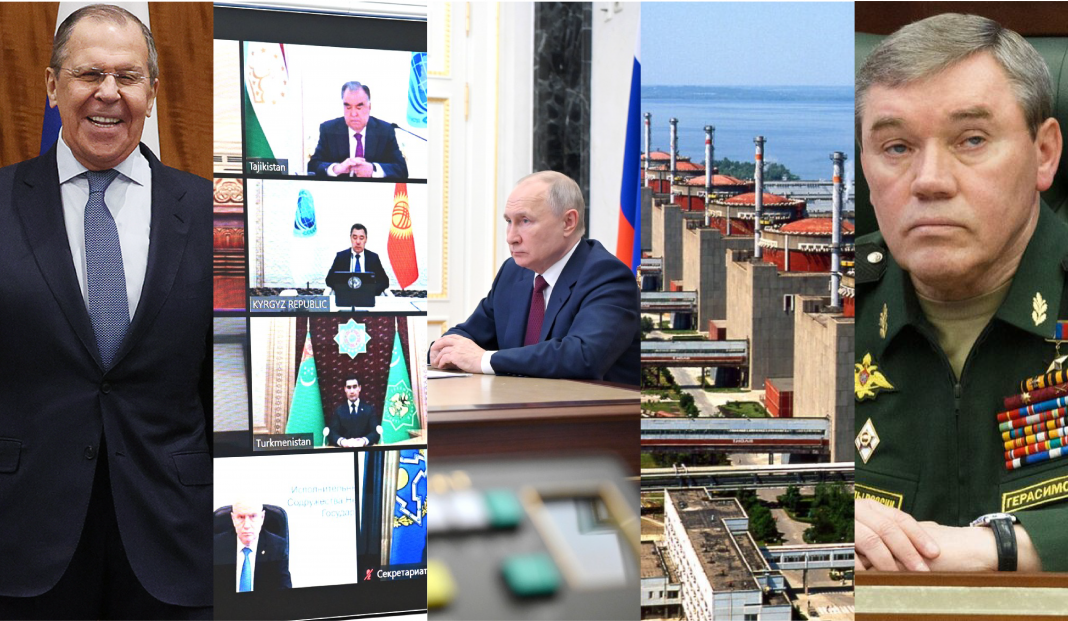This report describes the key events that significantly impacted Russia’s political, economic and social processes.
Based on the results of the past week, the following trends can be summarised:
- Russia continues to strengthen its engagement with other major regional players. Active interaction with China, India and Iran demonstrates that building a new regional policy is beginning to bear fruit, creating the outlines of a new multipolar world. In fact, splitting the world community into several camps has become irreversible. Now we can talk not so much about a return to the old, monopolar Pax Americana but to a series of international treaties that would consolidate the status quo and define the rules for interaction between groups of states. At the same time, it is essential to note that Russia cannot play a key role in such a world order. Its economy does not compete with China or India, and its resource base, although attractive, is not becoming strategically important.
- Putin continues to focus on social issues, which is understandable to ordinary Russians: despite sanctions and fighting, we are doing well in the economy, we are strong in social issues, and so on. The figures for combating unemployment are achieved, among other things, through mobilisation actions and the influx of personnel to military-industrial complex enterprises. In fact, it is not the number that is important but the reason for this or that phenomenon in the economy. Everything indicates that the Russian economy has been put on a severe military footing, which always leads to the illusion of full employment of the population.
- The intensification of the negotiation process between Russia and the United States demonstrates a change in geopolitical trends. The Russian-Ukrainian war turned out to be too exhausting for all sides. At the same time, in bilateral communications between Moscow and Washington, the Ukrainian issue is not seen as the main problem but as one of the elements of the global confrontation. It is obvious that the war has two development paths: either Ukraine will demonstrate serious success on the battlefield (as officials in the United States, Great Britain and France insist on), or then the “appeasement” mechanism will be launched, including through the developments of informal groups and to the detriment of the interests of Ukraine.
This report describes the topics being the most relevant for Russia during 03-09 July:
1. Meeting of the Heads Council of the SCO state members;
2. Situation about Zaporizhzhia NPP;
3. The situation around the “grain deal”;
4. Vladimir Putin’s meeting with members of the Russian Government;
5. Negotiation process between Moscow and Washington;
6. Rumors about the dismissal of the Chief of the General Staff of the Russian Federation, Valery Gerasimov, from the post of commander of Russian troops in Ukraine.
This Content Is Only For Subscribers
- Meeting of the Heads Council of the SCO state members
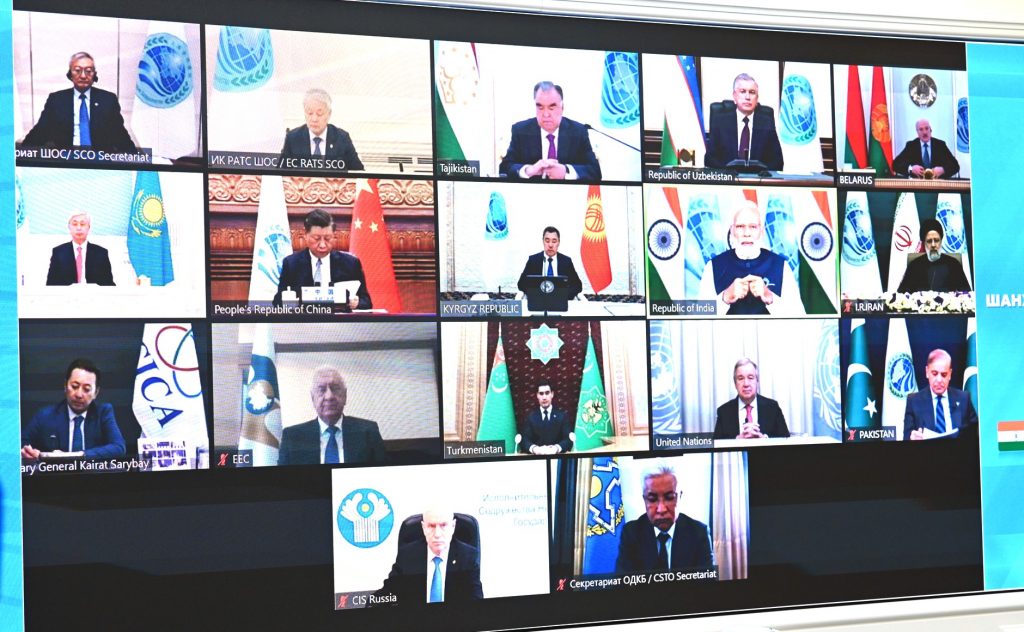
On Tuesday, July 4, a meeting of the Council of Heads of State of the SCO Member States was held via videoconference. The meeting was chaired by Indian Prime Minister Narendra Modi. President of Kazakhstan Kassym-Jomart Tokayev, President of Kyrgyzstan Sadyr Japarov, President of China Xi Jinping, Prime Minister of Pakistan Shehbaz Sharif, President of Tajikistan Emomali Rahmon, President of Uzbekistan Shavkat Mirziyoyev participated in the meeting as permanent members of the SCO. President of Belarus Alexander Lukashenko, President of Iran Ebrahim Raisi and President of Mongolia Ukhnagiin Khurelsukh also participated in the meeting as observers to the SCO. The meeting was attended by the President of Turkmenistan, Serdar Berdimuhamedov as a guest of the presiding side.
Following the meeting, the leaders signed and adopted a package of documents, including the New Delhi Declaration.
Key theses of Putin’s speech:
- “We consider it important that all association members agree on their assessments of the situation in world politics, security, social and economic spheres”.
- “For a long time, outside our borders, a project was being implemented by external forces to create from our neighbouring country, Ukraine, a virtually hostile state – “anti-Russia”. They pumped her up with weapons for eight years, condoned aggression against the civilian population of Donbas and indulged in every possible way in planting neo-Nazi ideology.”
- “In the current environment, our country continues to develop steadily. The Russian people are consolidated as never before. The solidarity and high responsibility for the fate of the Fatherland were clearly demonstrated by the Russian political circles and the whole society, speaking as a united front against the attempted armed rebellion.
- “The use of national currencies in mutual settlements is expanding. For example, more than 80 per cent of commercial transactions between Russia and the People’s Republic of China are carried out in rubles and yuan. The share of the Russian currency in export transactions with all SCO countries in 2022 exceeded 40 per cent.”
- “Russia actively implements the SCO road map on the transition to national currencies in mutual trade, approved at the previous summit in Samarkand in Uzbekistan. It is important to continue such work, to take coordinated measures to remove regulatory barriers, establish the necessary payment infrastructure, and create an independent financial system.”
- “It cannot but cause satisfaction that the authority and influence of our association continue to grow stronger, and the interest in its activities from other states and international structures is growing. Many of them are striving to establish an equal dialogue with the SCO and are considering the possibility of joining its work. They trust us; they want to be friends and cooperate with us.”
- “The Islamic Republic of Iran now participates in our organisation in a full-fledged format, and I want to sincerely congratulate the President of Iran, Mr Raisi, on this and from the bottom of my heart.”
Key theses from the New Delhi Declaration:
- “Today, the world is undergoing unprecedented transformational change and is entering a new era of rapid technological development that requires more effective global institutions. These fundamental processes are accompanied by the strengthening of multipolarity, the strengthening of interconnectedness and interdependence, and the acceleration of digitalisation.”
- “Member States, relying on the proximity or coincidence of assessments of the current regional and international agenda, reaffirm their commitment to the formation of a more representative, democratic, just and multipolar world order based on the universally recognised principles of international law, multilateralism, equal, joint, indivisible, comprehensive and sustainable security, cultural and civilisational diversity, mutually beneficial and equal cooperation of states with the central coordinating role of the UN”.
- “Member states, following the principles of the SCO Charter, adhere to a line that excludes bloc, ideological and confrontational approaches to solving problems of regional and international development, counteracting traditional and non-traditional challenges and threats to security.”
- “Member states consider Central Asia to be the core of the SCO and support the efforts of the region’s countries to ensure prosperity and peace, sustainable development and the formation of a space of good neighbourliness, trust and friendship.”
- “Member States categorically oppose militarising information and communication technologies (ICTs). They support the development of universal rules, principles and norms of responsible behaviour of states in this area, including welcoming the launch of the development under the auspices of the UN of a comprehensive international convention on combating the use of ICT for criminal purposes. Member States will continue cooperating within the framework of relevant negotiating mechanisms at the UN and other international platforms.”
- “Member States expressed their concern about the increased threats caused by the growth in the production, trafficking and abuse of narcotic drugs, the use of proceeds from drug trafficking as one of the sources of financing of terrorism”.
- “Member States that are parties to the Treaty on the Non-Proliferation of Nuclear Weapons stand for strict observance of the provisions of the Treaty, the comprehensive and balanced promotion of all the goals and principles fixed in it, the strengthening of the global regime for the non-proliferation of nuclear weapons, the continuation of the process of nuclear disarmament, as well as the promotion of an equitable mutually beneficial cooperation in the field of the use of atomic energy for peaceful purposes”.
- “Member States emphasise the importance of the Convention on the Prohibition of the Development, Production and Stockpiling of Bacteriological (Biological) and Toxin Weapons and on Their Destruction (BTWC) as one of the pillars of the global security architecture.”
- “The Member States believe that the entry into force of the Protocol to the Treaty on the Nuclear-Weapon-Free Zone in Central Asia for all signatory states will significantly contribute to ensuring regional security and strengthening the nuclear non-proliferation regime.”
Outcomes and outlook:
The SCO meeting itself was evidence of the development and existence of a single platform that underlies the construction of a new multipolar world. In this sense, the meeting and the developed platform are historically significant. In fact, the process of splitting the world community into several camps has become irreversible. Now we can talk not so much about a return to the old, monopolar Pax Americana but to a series of international treaties that would consolidate the status quo and define the rules for interaction between groups of states.
It is notable that the meeting participants recognised Central Asia as the core of the SCO – that is, Russia, China, and India agreed on a certain parity. This could lead to the rapid development of the Central Asian region in the next decade, especially against the background of the expected global economic crisis and the potential collapse of traditional financial and economic centres.
Putin’s speech at the SCO meeting was no different: he listed the reasons for the so-called “SMO”. He tried to justify himself again, showing the certainty and no alternative to such a path. However, this is not so important for the SCO countries – the topic of the Russian-Ukrainian war remains far from a primary challenge for them, although it is worth recognising the role of China and India in trying to resolve the conflict.
- Situation about Zaporizhzhia NPP
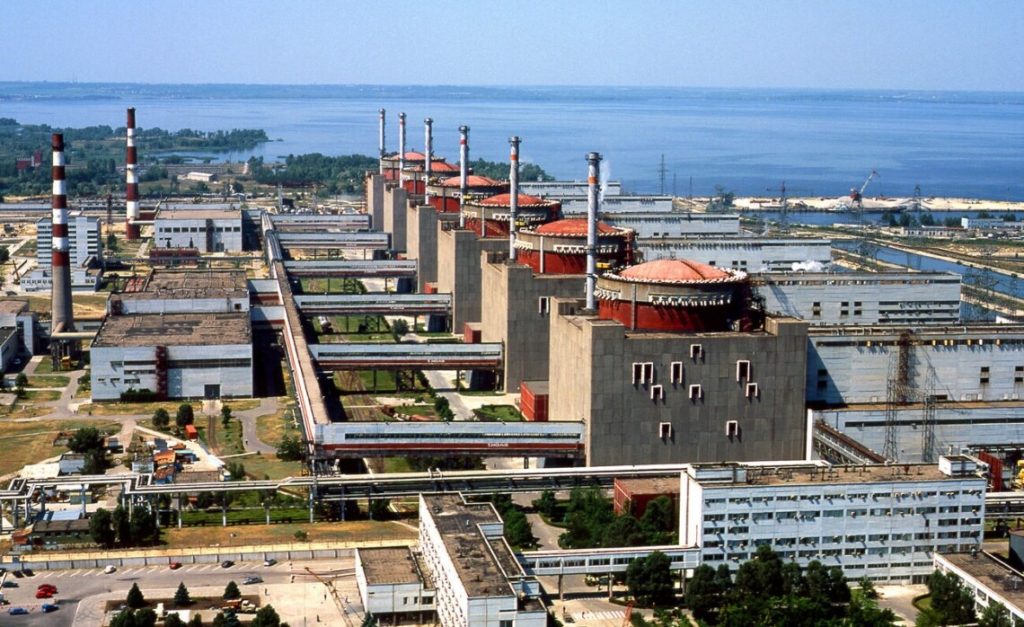
At the beginning of last week, the situation around the Zaporizhzhia nuclear power plant escalated considerably. Numerous statements began coming from the Ukrainian and Russian sides about preparations for sabotage to undermine the station and create a man-made disaster. At the same time, it is worth noting that such statements began to appear at the end of June. Both sides accused each other of such actions. At the same time, on Tuesday, information appeared that the station was to be blown up the next night. Since Wednesday, activity around this topic has decreased. At the same time, according to statements from both sides, the risk of undermining the ZNPP remains.
Timeline:
- On Monday, July 3, Commander-in-Chief of the Armed Forces of Ukraine Valery Zaluzhny and Chief of the General Staff Sergei Shaptala visited the Rivne NPP, where they agreed with the management of the plant and Energoatom to exchange information for planning actions in case of an explosion at the ZNPP.
- On Tuesday, July 4, Rosenergoatom announced that the Zaporizhzhya nuclear power plant was cut off from power supply for several hours and blamed Ukraine for this. Allegedly, Kyiv turned off the Dnieper power line, which supplies the station with electricity.
- Mikhail Podolyak, adviser to the head of the Presidential Administration, said that the threat of a terrorist attack at the Zaporizhzhia NPP was assessed as “50/50”: “On the one hand, the Russians understand that the world is watching closely. And they understand the consequences of a legal nature, including for Rosatom — they will definitely be there if Russia wants to do something.”
- The Department of Strategic Communications of the Armed Forces of Ukraine issued a warning about possible preparations for a provocation shortly on the territory of Zaporizhzhia NPP: “According to operational information, foreign objects similar to explosive devices were placed on the external roof of the third and fourth power units of ZNPP today. Undermining them cannot damage the power units, but it can create a picture of shelling from Ukraine.”
- Adviser to the head of Rosenergoatom, Renat Karchaa, said that on the night of July 5, the Armed Forces of Ukraine were allegedly going to attack the Zaporizhzhia nuclear power plant “using high-precision weapons and kamikaze drones”. According to him, the Armed Forces of Ukraine also intend to hit the station with a Tochka-U missile with a warhead filled with radioactive waste.
- In the evening report on Ukraine, the IAEA did not report any threats to the nuclear power plant. The only problem at the station, the IAEA, called the shutdown of the ZNPP power line.
- In his evening address, Volodymyr Zelensky, citing intelligence data, stated that something similar to explosives was placed at the ZNPP.
- On Wednesday, July 5, Serhiy Lysak, Head of the Dnepropetrovsk Regional Administration, said that local residents must stock up on water and food: “We’ve had a tough night. But the enemy has neither conscience nor common sense. The threat exists. So you have to be ready.”
- Against the backdrop of active discussions about the possible undermining of the ZNPP, Rafael Grossi, Director General of the IAEA, reiterated that during the last inspections, they did not find signs of mining at the plant: remain vigilant.”
- Journalists from the British edition of the BBC stated that, by studying satellite images of the ZNPP territory, they could not confirm the veracity of Ukraine’s claims that the Russian military had placed explosive devices on the roof of the ZNPP.
- On Thursday, July 6, the Head of the Main Intelligence Directorate of the Ministry of Defense of Ukraine, Kirill Budanov, said that the likelihood of a terrorist attack at the Zaporizhzhia nuclear power plant is becoming less: “And I think that now the danger of an artificial man-made disaster is slowly subsiding.”
- On Friday, July 7, Energoatom announced that the Russian military had placed machine-gun nests on the power units of the Zaporizhzhya NPP: “Machine-gun nests were placed on some of the roofs of the power units. And these pictures also indicate that there may be, in particular, explosives.
- As early as Saturday, July 8, the military intelligence of Ukraine announced that the Russian military continues to mine the ZNPP: “Mine-explosive barriers have been installed in the technical rooms and engine rooms, which consist of remotely controlled and unguided directional anti-personnel mines. Mainly Soviet directional mines are MON-50, MON-90, MON-100, and MON-200.
Outcomes and outlook:
The situation around the ZNPP has become a serious challenge not only for Ukraine and Russia but for all of humanity. It is clear6 that the Zaporizhzhia nuclear power plant is not the Chornobyl nuclear power plant and not Fukushima: there are reactors and safety systems of a completely different kind; a high-power nuclear explosion at the ZNPP is, in principle, impossible, and the design of the reactors is such that it can withstand even a nuclear strike.
But in any case, it would be a specific territory of nuclear contamination; a nuclear cloud could pose a danger to the whole of Eastern Europe, and the proximity of the Dnieper – one of the largest water arteries in Europe – could pose a threat to the entire Black Sea and Mediterranean basin.
Obviously, the parties to the conflict considered (and continue to consider) the ZNPP as an element of mutual blackmail (each side accused the enemy of preparing the explosion) and also as an element of drawing additional attention of the world community to the problems of the war. This is a serious argument after the explosion of the Kakhovskaya hydroelectric power station and on the eve of the NATO summit. The expected catastrophe did not take place.
- The situation around the “grain deal”
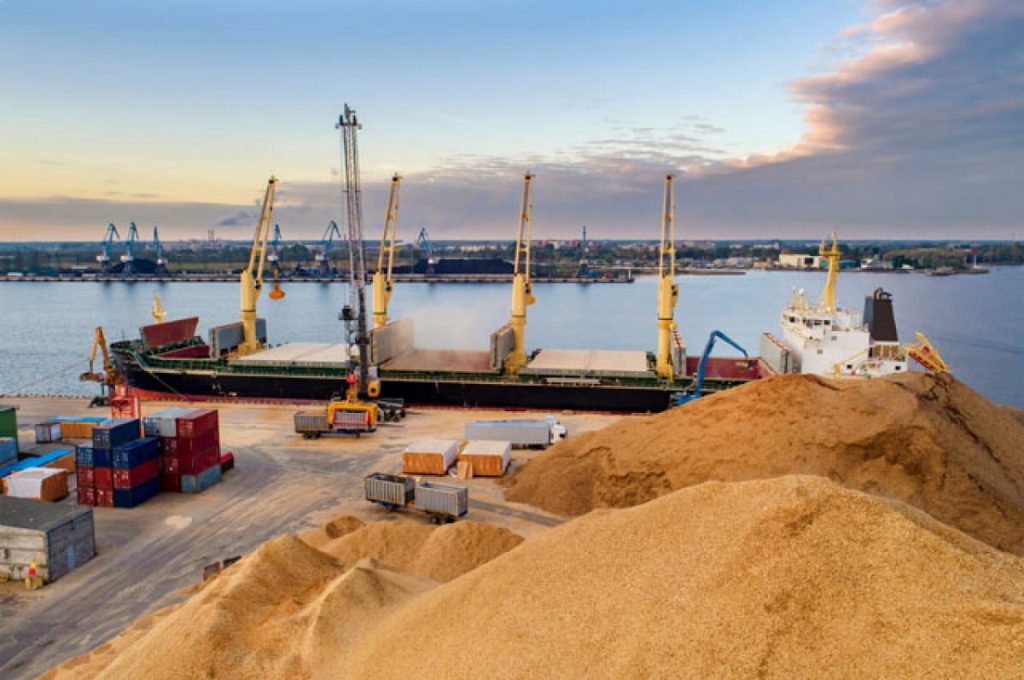
Recently, talks have intensified significantly about the future fate of the Black Sea Grain Initiative; the next term expires on July 17. Russia, already in its usual format, stated that extending the “grain deal” is unlikely. At the same time, Europe once again expressed its concern. At the same time, the Ukrainian authorities demonstrate confidence that further grain exports are possible without the participation of Russia.
Timeline:
- On Monday, July 3, the Financial Times, citing sources, said that the EU may allow Rosselkhozbank, cut off from SWIFT, to create a subsidiary bank with access to the international settlement system to extend the “grain deal”. According to the publication, such a plan was proposed by Moscow during negotiations mediated by the UN. EU leaders allegedly discussed it at a Brussels summit last week. The idea was hailed as the “worst option” to extend the “grain deal,” which “is a financial lifeline for Ukraine,” sources said.
- On Tuesday, July 4, Russian Foreign Ministry spokeswoman Maria Zakharova said that Russia had rejected establishing a non-sanctioned subsidiary of Rosselkhozbank to extend the “grain deal.” Zakharova noted that such a scheme is “obviously impassable” since “it takes many months to open a branch”, and Moscow is already being offered to agree to an extension: “Otherwise, as another “generous” proposal in the spirit of the initiative of the UN Secretary-General to restart the Togliatti ammonia pipeline -Odesa”, which was blown up on the territory controlled by Kyiv on June 5, you can’t name it.”
- On Friday, July 7, Vladimir Zelensky visited Turkey, during which he also met with Recep Tayyip Erdogan. The issue of extending the “grain deal” was also discussed during the meeting.
Outcomes and outlook:
Russia is increasingly saying that the “grain deal” will not be re-signed. Moscow does not see the point in re-signing it since the previous points relating to the interests of the Russian Federation are not being fulfilled.
Turkish President Erdogan continues to be the primary beneficiary of the deal. Still, he has fewer and fewer arguments to present to Russia. Erdogan’s latest moves show that he may start some minor blackmailing of Russia: handing over the “Azov” to Ukraine and a more than mild conversation with Biden is evidence of this. Erdogan also “leaked” information about the preparations for Putin’s visit to Turkey, tentatively in August 2023.
This should be a trilateral meeting of the leaders of Russia, Turkey and Syria to finally resolve the Syrian issue. However, this “leakage” also had the character of a certain blackmail – under certain circumstances, it may not take place, and the very fact of the cancellation of the visit will indicate severe problems in Russian-Turkish relations.
Most likely, Russia’s position will be determined immediately before the end date of the current deal – before July 17. In this case, there will be a serious week of negotiations and search by the parties for additional arguments.
- Vladimir Putin’s meeting with members of the Russian Government
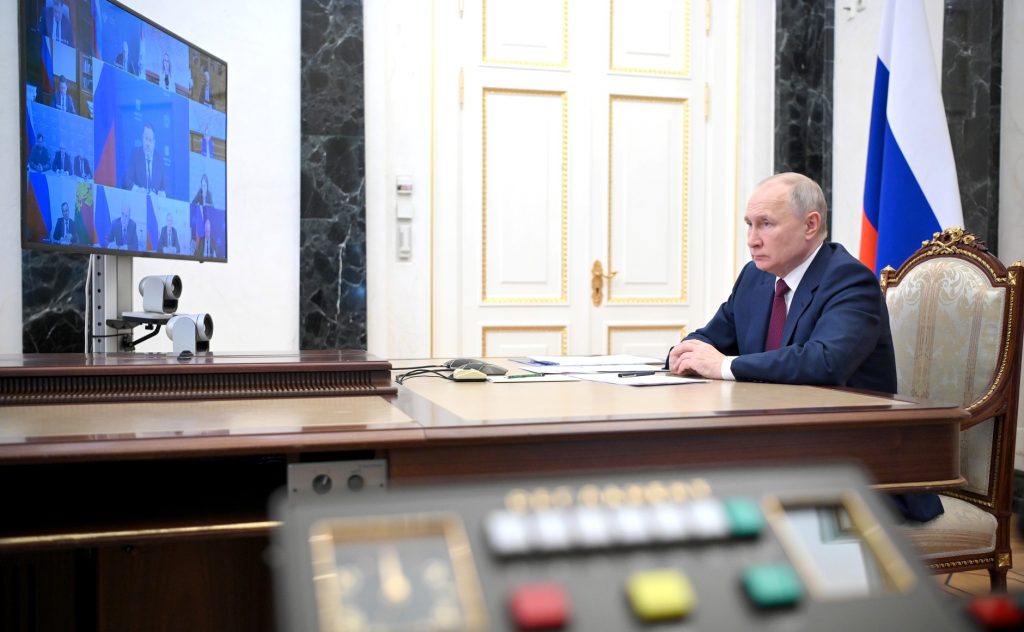
On Tuesday, July 4, Vladimir Putin held a meeting via videoconference with members of the Government of the Russian Federation. According to official reports, the main topics of the meeting were the situation at the entrance to the Crimean Bridge, as well as the prospects for the labour market due to the lowest unemployment rate. The main speakers were the Minister of Transport, Vitaly Savelyev; the “Head” of the temporarily occupied Crimea, Sergey Aksyonov; the Head of the Krasnodar Territory, Veniamin Kondratyev; the Minister of Labor and Social Protection, Anton Kotyakov; the Minister of Education Sergey Kravtsov, and Deputy Chairman of the Government Dmitry Chernyshenko.
Key theses:
- Savelyev: “After the terrorist attack on the Crimean bridge on October 8 last year, the third level of security was introduced, which implies a 100% inspection of all vehicles at the facility. This level of security is still in place to prevent the recurrence of terrorist attacks and the transport of prohibited goods.”
- Savelyev: “Only light vehicles and tourist buses are allowed on the bridge; trucks follow the ferry route. And at the same time, on July 7, the car-passenger ferry “Kerchinsky-2” entered the round-the-clock mode of operation.
- Savelyev: “I want to say that this morning I spoke with Sergei Kuzhugetovich Shoigu, and he will also provide us, if necessary, with two large landing ships, each of which takes 40 vehicles. If they make five flights a day in typical weather, there will be another 200 vehicles for each landing ship; in general, we will be able to transport up to a thousand vehicles along the crossing, bypassing the Crimean Bridge.
- Putin: “We have the lowest unemployment rate, which is very good: 73.4 million people are employed, 2.4 million people are unemployed, 3.2 per cent is a historic low.”
- Kotyakov: “Unemployment has decreased in all age groups, but most importantly, this figure has also decreased in the age group of young people. Difficulties for job seekers under 25 arise mainly when finding a job that needs or is possible to combine with studies or when choosing a first job, finding employment at the start of the so-called professional path.
- Kotyakov: “As for the demand for labour, today the number of offers on the portal “Work in Russia” has already exceeded the mark of one million 860 thousand vacancies, and we see that every third offer of vacancies refers specifically to the industry.”
- Kotyakov: “Today, we have a well-defined labour market for job seekers. We clearly see that the demand for personnel today exceeds the number of citizens looking for work, and soon, we do not plan any changes in the labour market in terms of a surge in unemployment.”
Outcomes and outlook:
Putin continues to focus on social issues, which is understandable to ordinary Russians: despite sanctions and hostilities, we are doing well in the economy, strong in social issues, and so on. The figures for combating unemployment are achieved, among other things, through mobilisation actions and the influx of personnel to military-industrial complex enterprises. In fact, it is not the number that is important but the reason for this or that phenomenon in the economy. Everything indicates that the Russian economy has been put on a severe military footing, which always leads to the illusion of full employment of the population.
The issue of the Crimean Bridge will be relevant until the end of hostilities – just like the final issue of establishing a reliable connection between Crimea and mainland Russia. This, in particular, was shown by Putin’s meeting with members of the Government.
Notably, in recent years such meetings have been held much more frequently. Against the backdrop of upcoming personnel reshuffles, both in the government and other power structures, it should not be ruled out that Putin is conducting a certain audit to select personnel.
- Negotiation process between Moscow and Washington
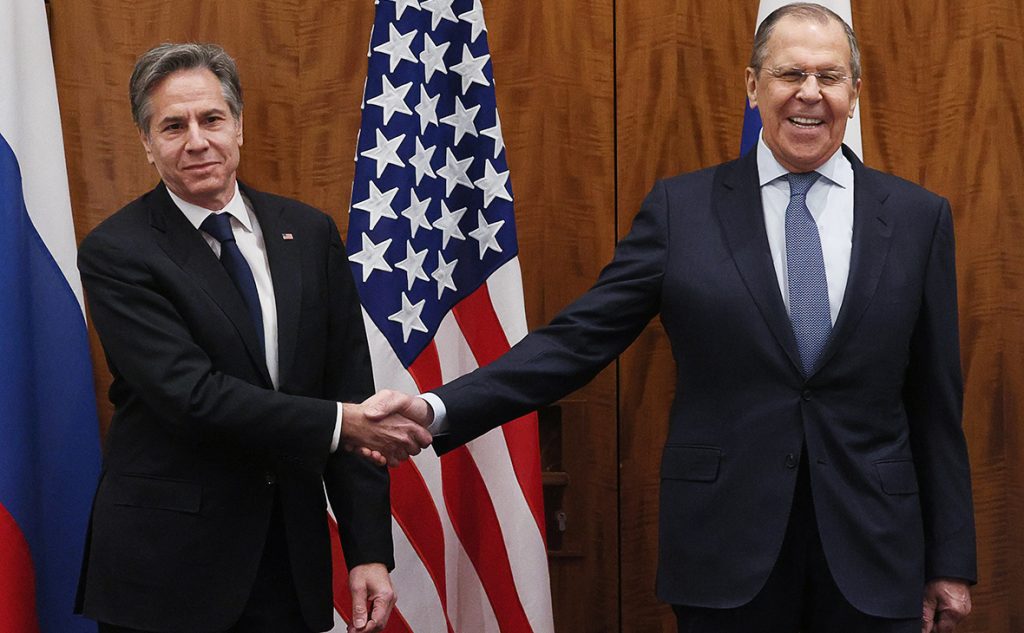
Recently, more and more information has appeared about the intensification of the negotiation process between Moscow and Washington. It is noted that such negotiations are not conducted at the official level. At the same time, if earlier Ascolta repeatedly published information about negotiations between Russia and the United States at the level of heads of intelligence services or individuals, now we are talking about informal contacts at the political level, which may indicate a completely different communication format.
Timeline:
- On Thursday, July 6, NBC News, citing its sources, stated that confidential talks are underway between the US and Russia over Ukraine. They are allegedly led by a group of former high-ranking US national security officials, ex-diplomats, and influential experts. In particular, former assistant to the head of the Pentagon Mary Beth Long, former diplomat and president of the Council on Foreign Relations Richard Haas, European expert Charles Kupchan and Russia expert Thomas Graham, and some former White House and State Department officials. On the Russian side, scientists, leaders of major think tanks or research institutes, “as well as other representatives of the Russian foreign policy sphere who are believed to be listened to by President Vladimir Putin or are in constant contact with decision-makers in the Kremlin.” It is noted that Russian Foreign Minister Sergey Lavrov attended one of the meetings. It was in April when Lavrov flew to New York to attend UN meetings.
- The Russian Foreign Ministry called the fake participation of Sergei Lavrov in negotiations with US representatives in Ukraine.
- White House Deputy Press Secretary Andrew Bates said that America is trying to win Kyiv on the battlefield, not to organise peace talks over Ukraine.
- On Friday, July 7, White House National Security Council spokesman John Kirby stated that they did not authorise or support such secret meetings but did not refute the fact that they were: “But I want to make it clear that these discussions were not encouraged or engendered by us, and we did not support them in any active way.”
- At the same time, US National Security Adviser Jake Sullivan denied recent publications about secret talks between the White House and the Kremlin on Ukraine. Sullivan said that the US government is not using private contacts between US citizens and Russia for diplomacy.
Outcomes and outlook:
Contacts between the United States and the Russian Federation (particularly on Ukrainian issues) are systemic and informal. They have not stopped since the start of hostilities. They are conducted with varying degrees of intensity at several sites and with the participation of several groups of negotiators.
Officials are not involved in this process, although they are informed about the results. At some stage (at the beginning of 2023), an attempt was made to involve Ukrainian experts in informal negotiations initiated by the influential American structure RAND Corporation. Still, the Office of the President of Ukraine strongly opposed such an initiative. That is why informal talks on Ukraine are being held today without the participation of Ukraine. In general, the effectiveness of such negotiations is relatively low: the parties exchange views, consider various options for mutual concessions, test the strength of diplomatic structures and put forward their own options for resolving the issue.
The West was not ready for a protracted war, which also exhausted its resources, so the West was interested in its speedy end. But all parties (including Ukraine) must save face in this situation. It is evident that the war has two development paths: either Ukraine will demonstrate serious success on the battlefield (as officials in the United States, Great Britain and France insist on), or then the “appeasement” mechanism will be launched, including through the developments of informal groups and to the detriment of the interests of Ukraine.
- Rumors about the dismissal of the Chief of the General Staff of the Russian Federation, Valery Gerasimov, from the post of commander of Russian troops in Ukraine
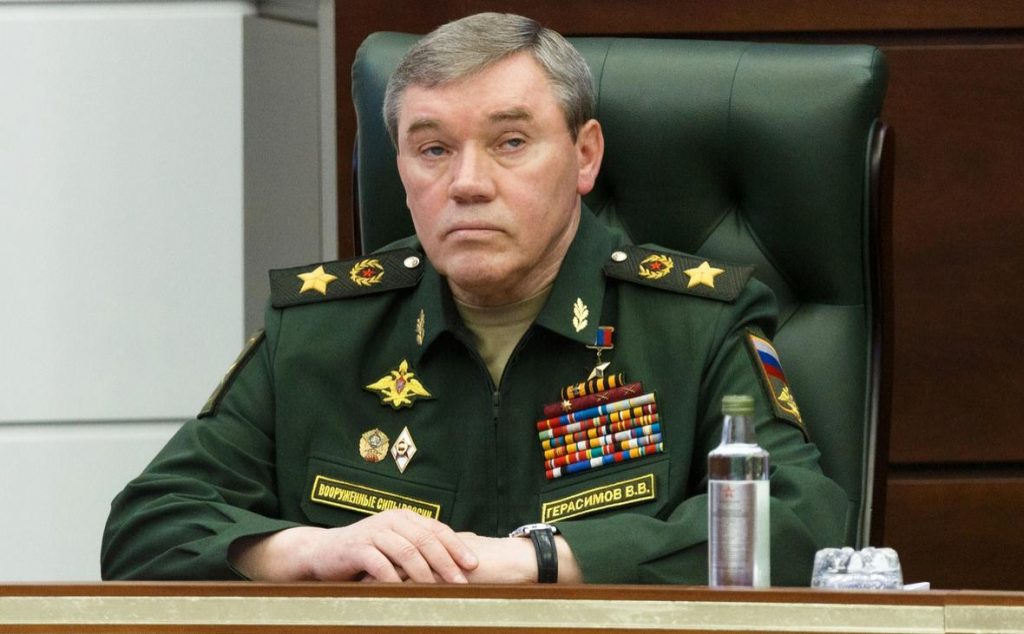
On Sunday, July 9, the Daily Mail published information according to which Vladimir Putin dismissed General Valery Gerasimov from the post of commander of Russian troops in Ukraine. The article also notes that Gerasimov was replaced by the commander of the Airborne Forces, Colonel-General Mikhail Teplinskiy.
“Gerasimov will remain in charge of the Russian army as chief of the General Staff, but overall responsibility for the war now falls on Teplinsky, commander of the country’s airborne troops,” the article says.
This information is not confirmed by official sources. At the same time, Ascolta received similar data from several sources at the beginning of the week, so it decided to analyse such reshuffles in the military leadership of the Russian Federation.
Outcomes and outlook:
Rumours about the upcoming Gerasimov’s dismissal have been circulating for a long time: Gerasimov turned out to be a brilliant strategist during the Syrian campaign and absolutely helpless in the conditions of the so-called “special military operation” in Ukraine (especially as commander of the troops). In addition, the Russian Armed Forces have outlined a severe campaign to rejuvenate personnel (Teplinskiy is 14 years younger than Gerasimov). Putin is promoting generals to the first positions, who were formed not only in the conditions of the Chechen and Syrian campaigns but also proved themselves after 2014 (according to available information, Teplinskiy, a native of Donbas, 2014 commanded Russian troops during the defeat of the Armed Forces of Ukraine near Ilovaisk). Teplinsky’s career developed immediately after the Russian invasion of Ukraine: it was in June 2022 that he became the head of the Airborne Forces. On the eve of the invasion, he received the colonel general rank. It is considered “Putin’s favourite”. As for General Gerasimov, he still remains Chief of the General Staff of the Russian Armed Forces.
The question is, for how long? In fact, Gerasimov is in disgrace; he could not show his effectiveness as the commander of the Russian troops in Ukraine, he did not achieve significant results, and some sources claim that Gerasimov was involved in the creation of the anti-Putin opposition, which was liquidated thanks to the “Prigozhin rebellion”. That is why it is expected that the final personnel decisions on Gerasimov can be made very soon.

